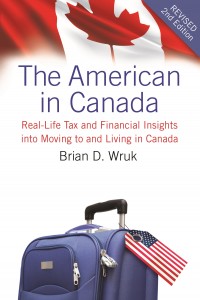
By Brian Wruk, CFP
Special to the Financial Independence Hub
As the Canadian tax deadline quickly approaches, the process of gathering all your tax slips, back-up for your deductions and getting them to your accountant begins or, maybe you are installing the latest tax software. Regardless, if you are a Canadian with some form of tax ties to the U.S., you may need to file a U.S. tax return as well. What kind of ties?
Let’s go through three of the most common ones:
- U. S. Citizenship – With all the media coverage, it is becoming common knowledge that being a U.S. citizen means you have to file a U.S. Form 1040 tax return. This is even more difficult to hide from the IRS since Canada signed an agreement that requires Canadian financial institutions to report all financial information tied to a “U.S. person.” This is all part of the IRS Foreign Account Tax Compliance Act (FATCA) initiative to crack down on U.S. citizens evading taxes through foreign accounts. Canadian financial institutions are reporting this information to Canada Revenue Agency, which in turn will provide that to the IRS as permitted by the Canada/U.S. Tax Treaty and the IRS will be looking for a tax return and the appropriate disclosures (FBARs).
But what if you have never lived in the U.S.? Never had a U.S. Social Security Number? Never took out a passport? My parents moved up here when I was young! Many feel they don’t have to file a U.S. tax return. Unfortunately, the IRS decides who has to file a return. The simple fact you are a U.S. citizen means you have to file a tax return . . . it is one of the “privileges” of being a U.S. citizen and all the protections and benefits that come with that.
But how will they know? First, the information to determine if you are a U.S. citizen is available to the IRS in public birth records. Second, with information coming from CRA on various accounts, no doubt the IRS will be cross-referencing several sources to see if you need to file a tax return.
Finally, the IRS has recently issued “streamlined” Offshore Voluntary Disclosure Procedures where you can get into compliance by filing the past three years’ tax returns and the last six years’ FBARs and no penalties will be assessed. It is likely you won’t owe any taxes in the U.S., as the taxes in Canada should offset any U.S. tax through foreign tax credits. It is also a moral question that depends on your values.
 At the end of the day, you have to decide whether you will follow the “laws of the land” or assess your risks of not doing so. You can pick up the newly released copy of my book The American in Canada – 2nd Edition for an extensive discussion of FATCA and assess your risks.
At the end of the day, you have to decide whether you will follow the “laws of the land” or assess your risks of not doing so. You can pick up the newly released copy of my book The American in Canada – 2nd Edition for an extensive discussion of FATCA and assess your risks.
- U.S. Green Card – If you have an old green card lying around in your wallet, you need to understand it is a “use it or lose it” proposition. You use your green card by living in the U.S. and filing U.S. tax returns or risk having it taken away when you cross the border. If you intend on retaining your green card, be sure you are filing U.S. tax returns annually.
- U.S. Source Income – During 2008, many Canadians took advantage of a strong Canadian loonie and a weak U.S. real estate market to buy a second home or an investment property in the U.S. If you sold your property in 2014 or generated any rental income you need to file a Form 1040NR tax return with the IRS, particularly if you did not remit the required withholding. It is usually best to file a 1040NR as you likely have a refund if you were subject to FIRPTA on the sale of your home or remitted the 30% withholding on your gross rents. You will need to get an Individual Tax Payer Identification Number, which you can obtain with Form W-7 when you file your tax return. Of course, any income you declare in the U.S. must be declared on your Canadian return as well, but make sure you take any U.S. taxes as foreign tax credits on your Canadian return. If you have any U.S. stocks that paid a dividend, a 15% withholding is required per the Treaty, which you can also use as a foreign tax credit on your Canadian return.
Brian Wruk, MBA, CFP®(US), CFP®(Canada), CIM, TEP is author of The American in Canada – 2nd Edition (just released) and The Canadian in America – 3rd Edition (coming in July).
Transition Financial Advisors Group, Inc. is the first Canada/U.S. financial planning, tax planning/preparation and investment management firm licensed to manage investments in both Canada and the U.S. all in one company.


